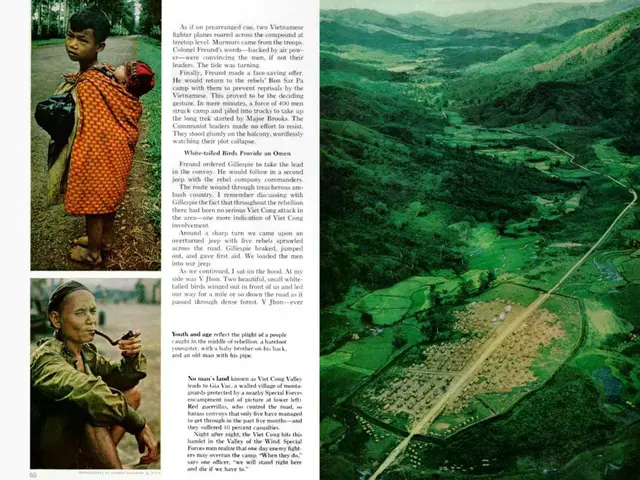Gaza under Israel's 10-week aid embargo: Desperate households resort to grinding lentils for wheat substitute
Host: AYESHA RASCOE
Stuck in the chokehold of Israel's blockade, Gaza has been left barren of all entries, including essential goods. Israel justifies this move, arguing it's a necessary step to pressure Hamas into freeing all hostages. The U.S., on the other hand, is maidenly proposing a new approach - a safe zone guarded by private security groups to distribute supplies. However, this plan has stirred reactions from international aid organizations within the U.N. They disagree, contending it's perilous for Palestinians and unfeasible. With pantry supplies dwindling, families are left grappling, stretching their meager rations, as our correspondent, NPR's Anas Baba, revelas.
Anas Baba: A lengthy queue snakes before a petite store, nestled amidst disarray of debris. This was once a bustling spot for procuring fresh spices for traditional Palestinian dishes, but now it just hosts a colossal grinder, grinding the dwindling stocks people possess.
(SOUNDBITE OF LENTILS FALLING)
Baba: Textured sacks of ground lentils and beans simulate the want of bread flour. There's but a smidgen of wheat flour left in Gaza. Mustafa Shalyil, a 32-year-old father, steps out of his tent, shrouded in dust after walking over a mile. His hand holds his palm-sized son, who shares in his filth from the strenuous trek.
MUSTAFA SHALYIL: (Speaking Arabic)
Baba: "Lentil soup doesn't hold us over for long," he shares. "Bread made from lentil flour keeps the hunger at bay for awhile." Shalyil indicates that the lentils he's had pulverized will only suffice his family for three days. Though it may be a customary practice to use legumes or other grains as flour for bread in certain cultures, it's unconventional in Gaza, and yet, many resort to it owing to sheer necessity. The U.N. attests to the fact that the warehouses have no food left.
(SOUNDBITE OF THUDDING)
Baba: Sixty-year-old Nadia Al-Masri molds large balls out of the grain mixture. The concoction is a bright orange hue, a rendition of lentil flour, soaked pasta, and water. Her son has just returned from the mill to the shelter where the family of 12 resides, cramped inside a classroom in a packed school sheltering hundreds of families. Flimsy tarps serve as flimsy barriers, doing little to separate one family from another.
In the corner, Masri fans a fire beneath a metal-covered oven, heating it with anything salvageable from the rubble of buildings devastated by Israeli airstrikes in Jabalia. The air swarms with the smell of smoke.
(SOUNDBITE OF THUDDING)
Baba: She flattens the dough into thick discs and lays them atop the oven to cook. She states that this hunger pangs are the worst her family has experienced since the conflict escalated more than 18 months ago.
NADIA AL-MASRI: (Speaking Arabic)
Baba: "Hunger," she whispers, "is when children wail themselves to sleep, wracked by hunger."
AL-MASRI: (Speaking Arabic)
Baba: "Why are you punishing everyone?" she queries. "What do we have to do with Hamas? It's not right to make an entire population suffer," she insists. "Why punish more than 2 million people?" Al-Masri wonders.
AL-MASRI: (Speaking Arabic)
Baba: Al-Masri hails her son, the hot bread is ready. If it cools, it hardens, making it impossible to consume. However, she admits that it's better than starving. Anas Baba, NPR News, Jabalia.
(SOUNDBITE OF MUSIC)
NPR transcripts are created on a rush deadline by an NPR contractor. This text may not be in its final form and may be updated or revised in the future. Accuracy and availability may vary.
Key Points:- Severe food shortages in Gaza due to Israeli blockade and lack of aid, with half of the population facing crisis levels of hunger and malnutrition- Lack of aid has led to increases in food prices and the use of alternative food sources such as lentil flour, soaked pasta, and other grains- The U.N. has run out of food stocks in Gaza and international organizations are urging for immediate action to alleviate the crisis and lift the blockade- Communities in Gaza are relying on local support networks to survive, but these efforts are strained by the severity of the crisis
Sources:[1] NPR (2021) Palestinian Families Stretch Scant Resources To Feed Children In Gaza[2] UN World Food Programme (2021) Gaza Crisis - Humanitarian Disaster Echoes Polio Refugee Camp[3] Al Jazeera (2021) Gaza: Children Under 5 Now Make Up One Third Of Refugees[4] The Guardian (2021) Israel Ups Pressure On Hamas, With Its Gaza Blockade Now The Tightest In Seven Years[5] United Nations Office for the Coordination of Humanitarian Affairs (2021) Gaza Strip: Situation Report 64 - 14 August 2021
- The U.S. is proposing a new approach to address the food crisis in Gaza, suggesting a safe zone guarded by private security organizations to distribute supplies, a move that has raised concerns among international aid organizations within the U.N.
- Despite the dwindling pantry supplies, families in Gaza are grappling to stretch their meager rations, with many resorting to unconventional methods like using legumes or other grains as flour for bread due to the scarcity of wheat flour.
- A lengthy queue can be seen before a tiny store in Gaza, where a colossal grinder now grinds the dwindling stocks of lentils and beans, a substitute for bread flour.
- With warehouses empty and the U.N. attesting to the fact that there's no food left, communities in Gaza are relying on local support networks to survive, but these efforts are strained by the severity of the crisis.
- Science and health-and-wellness experts are increasingly concerned about the long-term health impacts of the food crisis in Gaza, with half of the population facing crisis levels of hunger and malnutrition.
- The severe food shortages in Gaza have led to increases in food prices, looming over the general-news headlines alongside discussions of policy-and-legislation and politics, as the international community debates the best course of action to alleviate the crisis and lift the blockade.
- As families struggle to survive amidst the chaos of war-and-conflicts in Gaza, many are taking matters into their own hands, turning to healthy-cooking methods like lentil soups and bread made from lentil flour to ensure they have enough to eat for at least a few more days.








